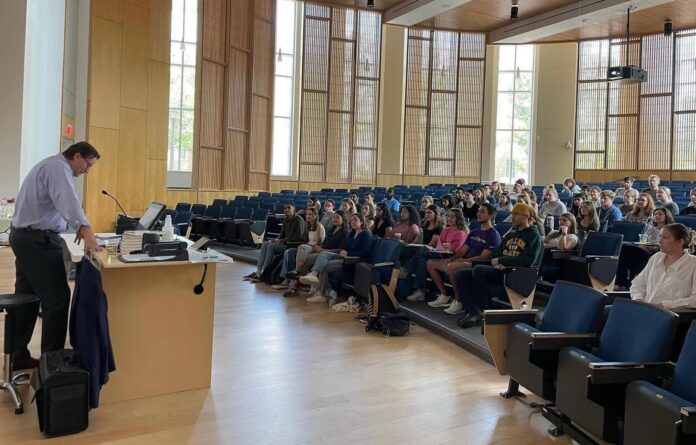The College of William and Mary’s chapter of the Innocence Project, a nationwide organization, prioritizes education, activism and fundraising initiatives to increase public awareness and support for the exoneration of wrongfully convicted people.
“It’s just something that so many people go through life knowing absolutely nothing about, which is crazy, because although it might not be statistically common, it’s way more common than you would ever hope to know,” Vice President of Education Outreach Sydney Kippelman ’25 said. “It’s just something that is so structurally rooted.”
The College’s Innocence Club works primarily with the Mid-Atlantic Innocence Project based in D.C. While chapters at law schools are able to work more directly with cases that the Innocence Project is involved in, Innocence Club members emphasized their interest in advocacy.
“It’s a lot of black and brown bodies that are disproportionately affected by mass incarceration,” Vice President of Events Outreach Terrence McDuffie ’27 said. “I want to do my part in making sure that these people have a voice, because they’re often left without one.”
Innocence Club meets on a weekly basis, participating in a variety of activities. McDuffie appreciates how the tight-knit community of the club fosters an open environment for members to discuss important topics.
“It creates a space where people who might be more soft-spoken are able to speak and share their opinions on something that they’re just as passionate about as anybody in the room,” McDuffie said.
Innocence Club’s members come from a variety of different backgrounds, fields of study and specific interests within the criminal justice system.
“I’m a film studies minor who’s about to go to film school,” Kippelman said. “I try my best to see the threads of these discussions we’re having. We might talk about how a main cause of wrongful convictions is inadequate defense. I’ll watch a movie and go, ‘Hey, this does a really good job of talking about that,’ and share that with people, just to get people to be more aware on a day to day basis.”
In such club discussions, the executive board also works to help members see the bigger picture of the topic of mass incarceration.
“It’s something that impacts everybody in a way that it’s so socially constructed and ingrained into our society. It’s not just, ‘Oh, this person’s in prison. I’m completely isolated from this incident,’” McDuffie said. “No, this person is in prison because of these overarching institutions that play a role in why you’re here and why you’re there. Connecting the dots for people is my overarching goal.”
While the executive board works to ensure they are sharing diverse perspectives within regular meetings, they also host guest speakers, including exonerees and attorneys. Those speakers have had some of the greatest impact on the executive board, club members and the larger College community.
In 2022, Innocence Club hosted Anthony Ray Hinton, an exoneree, to share his story.
“We probably had 100-150 people in the audience, and genuinely, nobody in the room was not crying,” Innocence Club President Sarah Long ’25 said. “It was the most incredible experience having people come up to us after and say, ‘This has changed my mind. I want to go to law school because of this. I’m going to join the club and I’m going to get involved in this way because of this event.’ That was something that was really, really impactful. And it was probably the thing I’m most proud of, was getting to have an impact on people’s lives in that way.”
Outside of regular club meetings and guest speakers, Innocence Club also engages in letter-writing days, where they call and email legislators in an effort to stop wrongful executions. They create templates to distribute across campus in order to amplify their efforts.
“It’s a great way for people to feel like they’re actually doing something and have something tangible from everything that they’re learning,” Kippelman said.
Outside of their meetings, fundraising is a huge facet of Innocence Club. They are actively holding a menstrual product drive, since there is no federal law mandating that those products are accessible in women’s prisons.
“While Virginia does supply some money for it on a state basis, we’re donating them to Virginia’s prisons so that they will have access, because otherwise women have to ration their period products,” Long said.
Innocence Club has been growing rapidly since their inception.
“The expansion of the club has been unbelievable,” Long said. “Just going from a couple of members to many members, from one event a year to three or four big events a year. I would say we now raise multiple hundreds of dollars a year, as opposed to when we started with probably more around $50 to $100 a year.”
With their increased size, the executive board is working on maintaining a tight-knit community. They aim to keep meetings from feeling like another class while still having intellectual, important conversations.
The club also takes pride in being open to the whole College community, no matter how often they attend meetings or when they join.
“We don’t have dues,” McDuffie said. “We don’t have anything like that. If you want to show up at the last meeting, that’s just as great as you showing up for the first one.”
Long commented on Innocence Club’s impact on her experience at the College.
“I have met some of the most amazing leaders I have ever met, just some of the most incredible people with a real passion for social justice and social change through the club,” Long said. “It’s been one of my most meaningful involvements on campus.”
Follow future Innocence Club initiatives and events on Instagram (@innocencewm).

